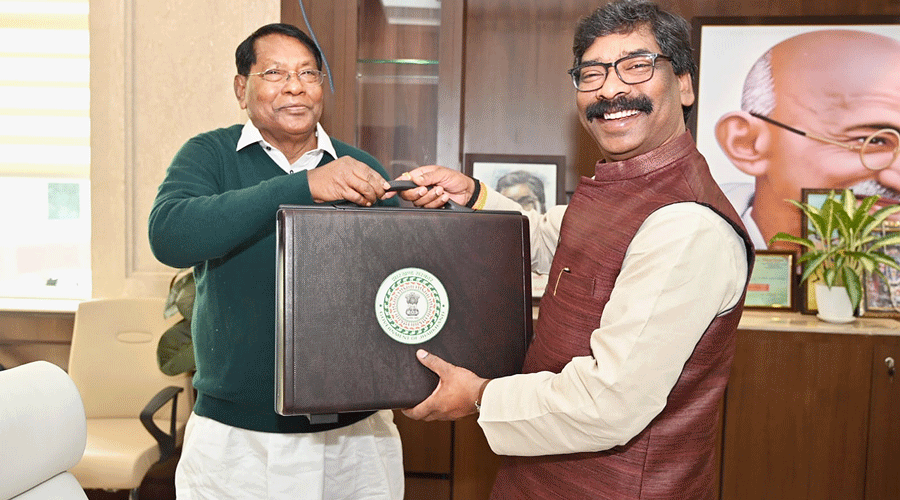The Jharkhand government on Friday tabled the annual budget worth Rs 1,16,418 crore for 2023-24.
State finance minister Rameshwar Oraon during the Assembly session in Ranchi said the budget had been prepared keeping in mind the Dalits, the poor and the common people.
Compared to the previous fiscal, the budgetary allocation has been increased by Rs 15,417 crore (15 per cent). The state government had tabled an annual budget of Rs 1,01,001 crore in 2022-23.
“One of the key achievements of the coalition government of the state in the last three years is that the planned expenditure has increased while establishment expenditure has been reduced which aims to generate more development opportunities,” Oraon said.
In the budget, Rs 84,676 crore has been proposed for revenue expenditure and Rs 31,742 crore under capital expenditure, Rs 33,378.45 crore for the general sector, Rs 43,303.44 crore for the social sector and Rs 39,736.11 crore for the economic sector.
Special attention has been given to the farmers. Loans worth Rs 1, 727 crore have been waived for 4.5 lakh farmers through the Jharkhand Agriculture Loan Waiver Scheme. An ex gratia of Rs 461 crore has been transferred to the accounts of about 13 lakh farmers at the rate of Rs 3,500 per farmer family as drought relief.
Apart from this, a Rs 500-crore allocation has been proposed to provide irrigation benefits to farmers and for water conservation.
The budget also proposed Krishi Samridhi Yojana to be implemented in 2023-24 with a focus on solar energy-based micro-lift irrigation, an economical means to streamline the irrigation system. The minister proposed Rs 180 crore for new dairy plants at Giridih and Jamshedpur, milk powder and milk product plants in Ranchi.
Millet Mission with a provision of Rs 50 crore will be started in order to promote millet production in the direction of moving towards organic farming. Millet Mission will be started to promote coarse grains.
“Our government has done better debt management to improve the fiscal health of the state and save the new generation from the legacy of economic burden. Due to better financial management in 2021-22, we managed to keep the fiscal deficit at less than one per cent due to which the debt GDP ratio has improved. As far as the state’s own revenue (tax and non-tax) is concerned, it stood at Rs 25,521.43 crore in 2019-20, increased to Rs 31,320.36 crore in 2021-22 and is expected to grow by 23.38 per cent and reach Rs 38,612.84 crore in 2022-23,” Oraon added.
The Hemant Soren-led Jharkhand cabinet on Thursday withdrew the Jharkhand Staff Selection Commission (JSSC) Examination (Amendment) Rules 2021, which made it mandatory for job aspirants from the general category to have passed Classes 10 and 12 from the state to apply for the Grade III and Grade IV jobs.
The cabinet also approved the inclusion of Hindi, English and Sanskrit in the list of regional language papers, which were kept out of it earlier.
In December, Jharkhand High Court had quashed the recruitment policy brought by the Jharkhand government in 2021.
According to the revised arrangement, 60 per cent of the seats, for which the JSSC would conduct examinations, would be reserved for locals by the virtue of job reservation to Scheduled Caste (SC), Scheduled Tribe (SC), Other Backward Class (OBC) category and the Economically Weaker Section (EWS) category. The rest 40 per cent of the seats would be in the open category.
In the new policy, the government had also reserved 100 per cent of Grade III & IV jobs for locals in 13 of the 14 districts, which fall under Schedule V of the Constitution, a special provision meant to safeguard the rights of tribals.











